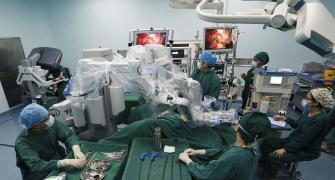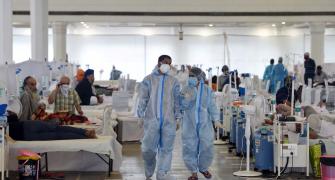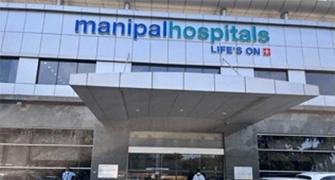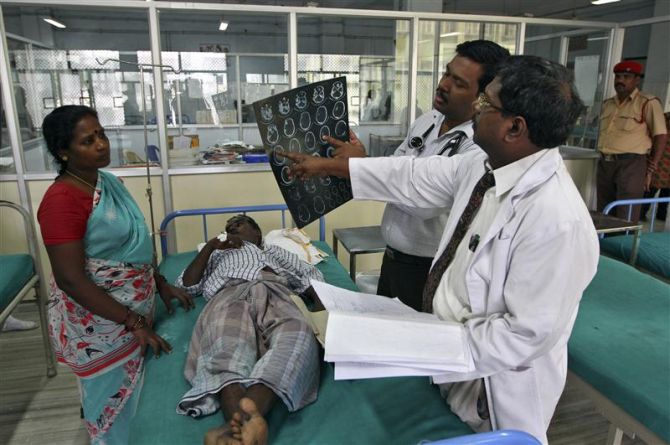'Every hospital now tracks length of stay closely.'
'More efficiency is brought into the system now.'
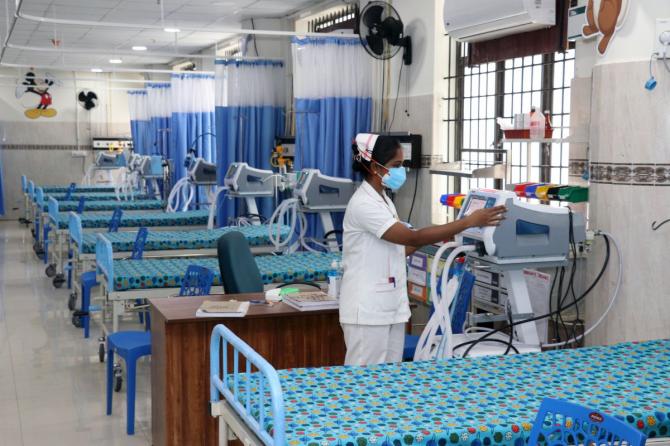
Sutapa Ghosh, 74, was discharged from a Mumbai hospital on the fourth day of her knee-joint replacement surgery for both knees.
The patient was mobilised (made to walk) a day after her surgical procedure.
Now a month later, Ghosh is able to walk without a stick, and is taking a flight of stairs.
"Getting to eat home-cooked food so soon was such a relief," said Ghosh, sporting a smile. "Pain management is much better than what I had expected," she said.
She was delaying her surgery for fear of pain.
Many patients like Ghosh are getting discharged sooner than ever from hospitals.
Dr Bishnu Panigrahi, group head, medical strategy and operations, Fortis Healthcare, said: "Every hospital tracks the length of stay closely. We cannot keep on increasing critical care beds. The number of patients coming for treatment across health care chains is increasing by the day. Insurance penetration and affordability are increasing. More efficiency is thus brought into the system now."
"Pain relief is taken care of in a manner that some hospitals are mobilising patients on the evening of the surgery. Early mobilisation helps in pain management and early discharge," Dr Panigrahi added.
The 'average length of stay' (ALOS) for Fortis Healthcare stood at 4.32 days in Q3FY24, down from the 4.42 days in Q3FY23.
ALOS is often used as an indicator of efficiency. A shorter length of stay will reduce the cost per discharge, and shift care from in-patient to less expensive and more patient-friendly environments such as home care or step-down units, say hospitals.
Dr Sandeep Budhiraja, group medical director, Max Healthcare, and senior director, Institute of Internal Medicine, said: "Max Healthcare has consistently focused on reducing the ALOS without compromising the clinical care."
Max Healthcare, he stated, had the most efficient ALOS at 3.87 days, comparable to the best standards globally.
If one analyses the investor presentations of Max Healthcare, it shows a steady decline in ALOS across its network -- from 5.2 days in FY21 to 4.3 days in FY23 and further down to 4.2 days in Q3FY24.
Max Healthcare has long-term contracts with certain societies that own and operate hospitals.
These hospitals are treated as partners in health care. Max Healthcare discloses its numbers for the entire network.
Dr Budhiraja said Max had achieved an efficient ALOS by using standardised care pathways for many surgical and clinical conditions; early and immediate assessment of patients for prompt diagnosis and interventions; and using technology such as minimally invasive surgeries.
"We carry out pre-anaesthesia check-ups, diagnostic tests and work up of patients in the pre admission phase for most elective procedures and surgeries," he said, adding that the hospital gave importance to high compliance with hygiene, cleaning, disinfection, sterilisation and use of personal protective measures by staff to reduce the risk of infection in patients.
Dr Budhiraja said reduced ALOS had helped with better turnaround time, more bed utlisation, and making more beds available to a larger patient base as beds are freed up.
"The incremental revenue is also a byproduct," he added.
Shortage of ICU beds is always a challenge and stepping down the patients early helps with freeing up beds for other critically ill patients, he said.
ICUs were 10 per cent of hospital beds earlier, said Dr Panigrahi. With health care becoming more advanced and more complex procedures happening, ICU beds kept on going up.
Now in major hospitals, 30 to 35 per cent of the beds are ICU beds, he added.
"The turnaround time has improved 40 to 50 per cent at industry level in the past few decades," Dr Panigrahi said.
Manipal Hospitals, the country's second-largest hospital chain, has seen its length of stay come down from 4.2 days to three over the past few years.
Dilip Jose, managing director and CEO of Manipal Health Enterprises, said clinicians' skills in minimally invasive procedures, advancements in medical technology, improvement in early diagnosis and the coming of age in fields like interventional radiology were contributing to reducing the ALOS.
Analysts say reducing ALOS was boosting revenues and also aiding margins.
Mythri Macherla, assistant vice-president and sector head, ICRA, told Business Standard because of the use of latest technological equipment, which reduced the time for critical procedures and efforts being put into streamlining their operations and increasing patient throughput, ALOS was reducing.
This in a way is increasing their revenue and also supporting margin improvement, she added.
Some industry insiders, however, say reducing ALOS was not a business or capacity management strategy.
Ankit Thakker, CEO, Jupiter Life Line Hospitals, said: "ALOS is coming down globally, especially for surgical and interventional procedures, due to advances in technology and treatment protocols. This is independent of bed availability. Reducing ALOS is not a business or capacity management strategy. It is a result of clinical advancement."
- Reduced costs and wasteful processes
- Enhanced patient experience
- Prevention of hospital acquired infections
- Standardised care and better clinical outcomes
- Increased turnover of beds by proper utilisation of beds
- Better productivity of resources
Feature Presentation: Rajesh Alva/Rediff.com


